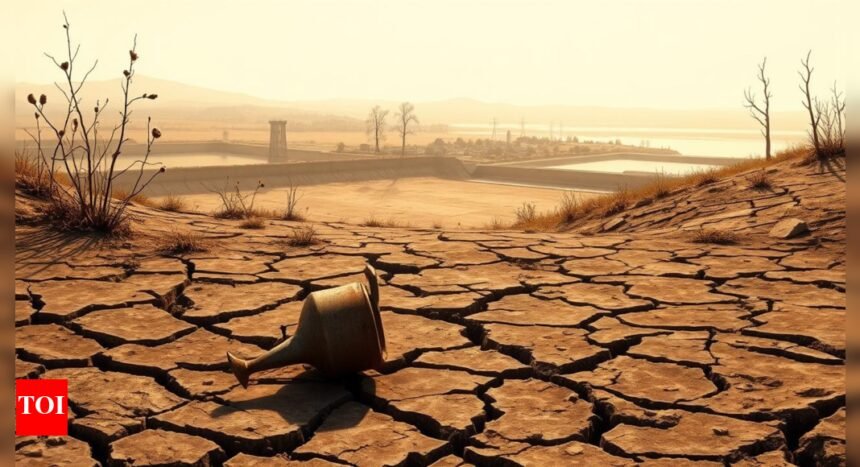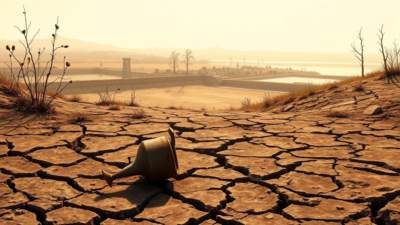Water scarcity is a fact of life in Malta. The island in the middle of the Mediterranean, between Italy and North Africa, has no lakes or rivers and doesn’t get much rainfall. And with a hot, dry climate, a population of 563,000 — and more than six times that in yearly tourist visits — every drop counts.“We have lived forever without enough water,” said Thomas Bajada, a marine biologist and recently elected member of the European Parliament. But, he told DW, that scarcity has forced his country to innovate.Today, around two-thirds of its drinking water comes from the sea, desalinated water that’s blended with a minimal supply of groundwater. Investment in other technical solutions, smart water meters, leakage management, and wastewater reuse, also helps keep the taps from running dry. For now, at least.
One-fifth of Europe already under water stress
But as temperatures rise and weather patterns become increasingly unreliable due to climate change, Malta’s water challenges are expected to spread.With many European cities and regions still relying on outdated water management practices, around one-fifth of the continent already faces water stress every year, the European Environment Agency (EEA) reported. It noted that Europe is anticipating water demand to double by 2050, leading to severe water shortages in the future.“Europe is at the forefront of a growing water crisis — one that threatens industry, agriculture, ecosystems and citizens’ access to water,” said Loic Charpentier, advocacy head at industry body Water Europe, which promotes water technology.Extreme heat and prolonged periods of drought, once rare in Europe, are becoming a yearly problem in many regions. Multiple heat waves in 2024 shattered temperature records, with Central and Eastern Europe and the Mediterranean region suffering the most from heat stress and shrinking water reserves, according to data from the EU’s Copernicus Climate Change Service.The first-ever European Climate Risk Assessment, released by the European Environment Agency in March 2024, stressed that these new weather extremes were already severely disrupting ecosystems, agriculture and economic activity, human health and water supplies. Drought and extreme heat could also “exacerbate existing risks and crises … leading to water and food insecurity, disruptions of critical infrastructure, and threats to financial markets and stability.“
Water scarcity leaded to ‘rising conflicts’
“No one sees what is coming when we speak about water, both water pollution and water scarcity,” said Athenais Georges of the European Water Movement advocacy group. “It’s a huge environmental and social justice issue, because if you have scarce water, you have rising conflicts. [We’ve seen] that already in other regions in the world.”In 2012, the European Water Movement spearheaded the Right2Water campaign, signed by more than 1.6 million EU citizens, which called on the European Commission to make sure water remains a public service and “ensure that all inhabitants enjoy the right to water.”The Drinking Water Directive, the EU’s main law on drinking water, was revised following the campaign and entered into force in 2021. It obliges EU member countries to “improve access to safe drinking water” for all citizens.And yet, EEA data shows that some 30% of EU citizens still suffer water scarcity every year.
Can a new EU water strategy fix this?
The European Commission is due to finally present its Water Resilience Strategy in early June, after taking it off the agenda ahead of the 2024 EU elections in the wake of farmer protests and right-wing criticism of the EU’s ambitious climate plans. The strategy is expected to focus heavily on efficiency, water reuse and technological fixes — especially in sectors that rely on water, like industry and agriculture.“We want to address the root causes of water challenges, including pollution, scarcity and the impact of climate change,” said Jessika Roswall, the EU commissioner for the environment and water resilience, speaking at the European Parliament in early May. She also highlighted plans to “foster the competitive edge of our EU water industry.”Lawmakers called on the EU Commission to be “ambitious” in its update to the current water management and climate adaptation strategy, which Bajada called “scattered, sectoral and unreactive”.“That means moving from promises to real, binding action. We cannot afford to treat water as infinite. That is why this report calls for enforceable water efficiency and abstraction targets — sector by sector, basin by basin,” said Bajada, the report’s rapporteur. He acknowledged that while water management is a national issue, enshrined in the EU treaty, member states also need to understand that it is a responsibility shared across borders.
Solutions: Modernize infrastructure, boost efficiency
EU lawmakers said the Commission must prioritize dedicated funding for water resilience — money to modernize water infrastructure, set up nature-based solutions and use artificial intelligence and other emerging technologies to boost efficiency, monitoring and security.“We need money to directly invest in innovation, to directly invest in a smarter way of water management, in industry, in agriculture,” Bajada, of the center-left Socialists and Democrats group, told DW. “Let’s invest through public-private partnerships, using the [European Investment Bank] to scale up investment, but also a direct line in the upcoming [EU] budget.”
Can desalination solve the global water crisis?
“Drought and climate adaptation are only part of the larger puzzle,” Charpentier, of Water Europe, said in an email, emphasizing the need to develop new infrastructure and expand digitalization. “Europe must stimulate investments across sectors — from citizens and businesses to local and regional authorities.”
Restoring water by ‘giving space back to nature’
Environmental campaigners, however, are disappointed in what they said were successful efforts by conservative and far-right lawmakers to dilute the role of nature-based solutions, saying it set a “worrying precedent” ahead of the release of the Commission’s strategy. They have called out the move to weaken nature restoration and conservation goals, along with measures to address water pollution.“We cannot tackle a continent increasingly depleted of clean water or repair broken water cycles without working with nature,” said the Living Rivers Europe NGO coalition in a statement. “Nature-based solutions, such as restoring wetlands and removing barriers obstructing rivers, are far more cost-effective, straightforward, and environmentally sustainable than grey infrastructure and techno-fixes.”“You cannot comply with environmental, social and ethical objectives when you are profit-driven,” said Georges of the European Water Movement, which campaigns against the privatization of water services. She told DW that new, modern infrastructure like desalination plants and dams were energy intensive to build and operate, and require costly maintenance.By contrast, she said, an approach that helped to retain more water in the soil and replenish depleted groundwater reserves — for example, by using permeable surfaces in cities, or giving more space to rivers and streams — was more sustainable in the long run.“If you take a look at both [types of] solutions, what’s easier, what’s the most cost efficient?” said Georges. “It’s just giving space back to nature.”







